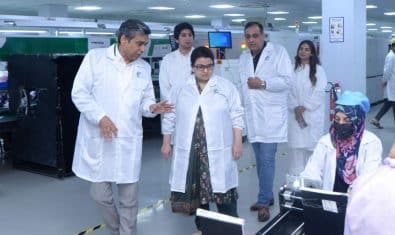National Assembly Speaker, Asad Qaiser, handed over a comprehensive and integrated structural reform-oriented agricultural growth strategy for the next seven years to the Minister for National Food Security and Research, Syed Fakhar Imam, and Sub-committee of the Cabinet on Agriculture.
ALSO READ
Cotton Output Falls to Lowest Level in Three Decades
The chief components of the strategy include:
- Special initiatives for Balochistan, South Punjab, KP, and Tharparkar.
- Cotton Revival program.
- Oilseed Development.
- Low-Cost Refinance Line of Credit.
- Credit Enhancement for Digital Production Finance.
- Digitization of Demand-Driven Extension Content.
- Integrated Seed System.
- Agriculture Climate Change Insurance Pool (Farmer Risk Transfer Mechanism)/Satellite-based Crop Reporting).
- Establishment of Agriculture Development Authority for Coordination of Reform Implementation.
- Linkages with Ehsaas, Kamyab Jawan, and CPEC.
- Incentives for promoting investment in warehousing, contract farming, and farmers produce organizations.
The NA speaker added that the overarching objective is to achieve an Agriculture growth rate of 7.5 percent annually by the fiscal year 2027-2028 (FY28), led and sustained by producer-owned integrated market-based value chains that incentivize producers to continue investing in modern and climate-smart production technologies, expansion of cultivated land area and value-added activities.
It was also mentioned that the overarching goal of the proposed strategy is to boost agricultural exports, accelerate rural-development-driven economic growth, reduce rural poverty, enhance financial and gender inclusion in the agricultural sector.
It was added that the proposed model envisions a pro-poor growth strategy focusing on the transformation of the business model of the 7.4 million smallholder farmers who cultivate 48 percent of the total cultivable land.
ALSO READ
Kuwait Keen to Invest in Pakistan’s Agriculture Sector
It was stated that the weak business model of the smallholder farmers, comprising low bargaining power, low access to finance, low yields, fragmented market segment, lack of access to competitive markets, and high production cost, hindered the modernization of the agriculture sector.
It was maintained that the proposed strategy drawing upon eco-system based, multi-pronged three-phased stagey seeks to transform Pakistan’s subsistence agriculture into modern, diversified, competitive, and high-value agriculture with a particular focus on productivity and profitability of the smallholders’ farmers.
The Speaker added that the plan is to accelerate the modernization of the agriculture sector so that the sector can generate resources for the sustained development of the economy with a high degree of self-reliance.

























